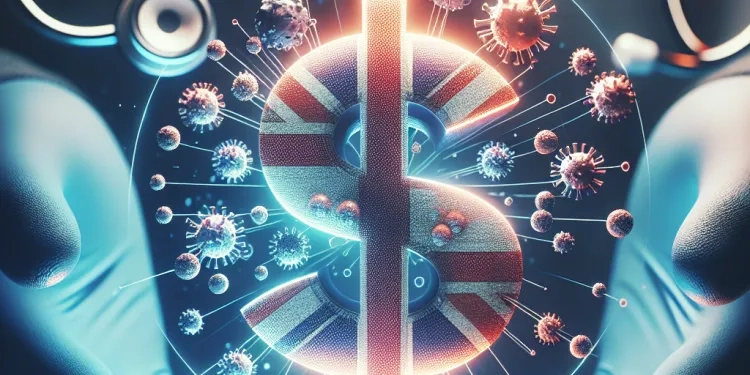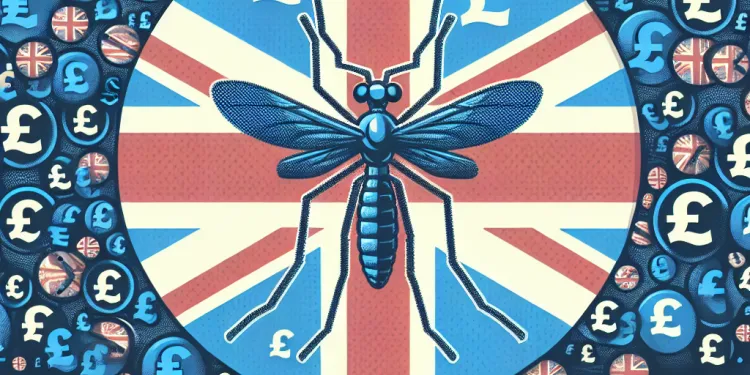
Find Help
More Items From Ergsy search
-

Can Nipah Virus cause neurological complications?
Relevance: 100%
-

What is Nipah Virus?
Relevance: 67%
-

What are the symptoms of Nipah Virus infection?
Relevance: 64%
-

Is there a cure for Nipah Virus?
Relevance: 60%
-

How is Nipah Virus diagnosed?
Relevance: 54%
-

Which animals are known to carry Nipah Virus?
Relevance: 53%
-

Has a vaccine been developed against Nipah Virus?
Relevance: 53%
-

How is Nipah Virus transmitted?
Relevance: 53%
-

Where was Nipah Virus first identified?
Relevance: 52%
-

What is the mortality rate of Nipah Virus infection?
Relevance: 52%
-

Can Nipah Virus cause outbreaks?
Relevance: 52%
-

What role do fruit bats play in Nipah Virus transmission?
Relevance: 50%
-

What should someone do if they suspect Nipah Virus infection?
Relevance: 49%
-

What global organizations are involved in Nipah Virus research?
Relevance: 48%
-

How is Nipah Virus controlled during outbreaks?
Relevance: 48%
-

Can Nipah Virus be transmitted from person to person?
Relevance: 48%
-

Why are Nipah Virus outbreaks considered a public health concern?
Relevance: 48%
-

What regions are most at risk for Nipah Virus outbreaks?
Relevance: 47%
-

What preventive measures can reduce the risk of Nipah Virus infection?
Relevance: 46%
-

Are there any complications associated with shingles?
Relevance: 35%
-

What are the complications of chickenpox?
Relevance: 34%
-

Are there any complications associated with shingles?
Relevance: 32%
-

What are the symptoms of Marburg virus disease?
Relevance: 32%
-

Are there treatments for West Nile Virus?
Relevance: 30%
-

What are the symptoms of West Nile Virus?
Relevance: 30%
-

What is the typical progression of Marburg virus disease?
Relevance: 28%
-

What complications can arise from measles?
Relevance: 28%
-

What is Nipah Virus?
Relevance: 27%
-

Can measles cause complications?
Relevance: 27%
-

What are the symptoms of Zika virus?
Relevance: 27%
-

Is there a test for West Nile Virus?
Relevance: 25%
-

Is there a vaccine for West Nile Virus?
Relevance: 25%
-

Can Zika virus affect pregnancy?
Relevance: 25%
-

What is West Nile Virus?
Relevance: 24%
-

Can pets get West Nile Virus?
Relevance: 24%
-

Who is most at risk for complications from H3N2?
Relevance: 24%
-

How prevalent is West Nile virus in the UK?
Relevance: 24%
-

What are some complications associated with H3N2?
Relevance: 24%
-

Can meningitis cause long-term complications?
Relevance: 24%
-

Is there a vaccine for the Zika virus?
Relevance: 24%
Understanding Nipah Virus
Nipah virus (NiV) is a zoonotic virus, meaning it can be transmitted from animals to humans. It was first identified during an outbreak in Malaysia in 1998. The virus is harbored in fruit bats of the Pteropus genus, which are considered its natural hosts. Transmission to humans can occur through direct contact with infected animals, contaminated food, or close contact with infected individuals.
Symptoms of Nipah Virus Infection
The symptoms of Nipah virus infection can range from mild to severe. The incubation period is typically 4 to 14 days after exposure. Initial symptoms are usually nonspecific and resemble influenza, with fever, headache, muscle pain, vomiting, and sore throat. In more severe cases, individuals may experience respiratory distress, brain swelling, and even go into a coma.
Neurological Complications of Nipah Virus
One of the most concerning aspects of Nipah virus infection is its potential to cause severe neurological complications. The virus can lead to acute and potentially fatal encephalitis, an inflammation of the brain. This complication is responsible for a significant proportion of the mortality associated with the disease.
Patients with Nipah virus encephalitis may experience a range of neurological symptoms, including altered mental status, confusion, disorientation, and seizures. The progression of encephalitis can be rapid, leading to a decline in consciousness and coma. In some cases, neurological symptoms can persist even in patients who recover, indicating potential long-term complications.
Diagnosing and Managing Neurological Complications
Accurate and timely diagnosis is critical for managing Nipah virus infections and associated neurological complications. Confirmatory diagnosis usually involves laboratory testing, including Polymerase Chain Reaction (PCR) and viral isolation techniques, to detect the presence of the virus.
As there is currently no specific antiviral treatment for Nipah virus, management largely involves supportive care. Patients with neurological complications may require intensive care to support vital functions. This can include mechanical ventilation for those with respiratory distress and measures to cope with cerebral edema and seizures.
Preventive Measures and Global Concerns
Prevention of Nipah virus infections focuses on reducing the risk of animal-to-human and human-to-human transmission. This includes avoiding consumption of raw date palm sap, which can be contaminated by bat excretions, and practicing good hygiene. Healthcare workers should follow strict infection control measures to prevent nosocomial transmission.
Global health organizations, including the World Health Organization, continue to monitor Nipah virus due to its potential for causing outbreaks with high mortality rates and serious neurological complications. Research is ongoing to develop vaccines and antiviral therapies, aimed at reducing the public health impact of this dangerous pathogen.
Frequently Asked Questions
What is Nipah virus?
Nipah virus is a zoonotic virus that can be transmitted to humans from animals and can also spread through contaminated food and directly between people.
Can Nipah virus cause neurological complications?
Yes, Nipah virus can cause severe neurological complications, including encephalitis, which is inflammation of the brain.
What are the neurological symptoms of Nipah virus infection?
Neurological symptoms of Nipah virus infection include headache, dizziness, altered consciousness, and in severe cases, encephalitis and seizures.
How does Nipah virus cause encephalitis?
Nipah virus can infect the central nervous system, leading to inflammation and swelling of the brain, which can cause encephalitis.
How severe are the neurological complications of Nipah virus?
Neurological complications of Nipah virus can be severe and life-threatening, with high mortality rates reported in many outbreaks.
Is there a treatment for the neurological complications caused by Nipah virus?
Currently, there is no specific antiviral treatment for Nipah virus infection. Supportive care is the mainstay of treatment for neurological complications.
Can Nipah virus infection result in long-term neurological effects?
Survivors of Nipah virus infection may experience long-term neurological effects, such as persistent convulsions and personality changes.
What is the mortality rate from neurological complications of Nipah virus?
The mortality rate from Nipah virus can be as high as 40-75%, and neurological complications significantly contribute to this high mortality.
How can the neurological complications of Nipah virus be managed?
Management of neurological complications involves supportive care, including medications to reduce swelling in the brain and continuous monitoring in an intensive care setting.
Are there differences in neurological outcomes between children and adults infected with Nipah virus?
Both children and adults can experience severe neurological outcomes due to Nipah virus, though the specific outcomes and severity can vary.
How quickly can neurological symptoms appear after infection with Nipah virus?
Neurological symptoms can appear rapidly, often within a few days to two weeks after exposure to Nipah virus.
Have there been outbreaks of Nipah virus with a high incidence of neurological complications?
Yes, Nipah virus outbreaks, such as those in Malaysia and India, have seen high incidences of neurological complications, including encephalitis.
Are there preventive measures to avoid neurological complications from Nipah virus?
Preventive measures include avoiding exposure to infected animals and humans and practicing good hygiene, as there is no vaccine to prevent Nipah virus infection currently.
Can neurological damage from Nipah virus be reversed?
Once significant neurological damage has occurred, it may not be fully reversible, emphasizing the importance of early detection and supportive care.
What research is being done to address Nipah virus and its neurological complications?
Research is ongoing to develop effective vaccines and antiviral treatments to prevent and mitigate the impact of Nipah virus and its complications.
Why is it challenging to treat neurological complications from Nipah virus?
The challenges include the rapid progression of the disease, lack of specific antiviral treatments, and difficulties in diagnosing encephalitis early.
Can infected individuals transmit Nipah virus while showing neurological symptoms?
Yes, individuals showing neurological symptoms can still transmit Nipah virus to others, particularly in healthcare settings.
Are neurological complications of Nipah virus similar to those caused by other viral infections?
While some symptoms may be similar to other viral encephalitides, Nipah virus infections are particularly severe and have a high mortality rate.
What role does the immune response play in Nipah virus neurological complications?
The immune response may contribute to the severity of neurological symptoms, as the body's reaction to the virus can exacerbate brain inflammation.
How is Nipah virus-related neurological complication diagnosed?
Diagnosis involves laboratory confirmation of Nipah virus and clinical evaluation of neurological symptoms, often using imaging techniques like CT or MRI scans.
Useful Links
This website offers general information and is not a substitute for professional advice.
Always seek guidance from qualified professionals.
If you have any medical concerns or need urgent help, contact a healthcare professional or emergency services immediately.
Some of this content was generated with AI assistance. We’ve done our best to keep it accurate, helpful, and human-friendly.
- Ergsy carfully checks the information in the videos we provide here.
- Videos shown by Youtube after a video has completed, have NOT been reviewed by ERGSY.
- To view, click the arrow in centre of video.
- Most of the videos you find here will have subtitles and/or closed captions available.
- You may need to turn these on, and choose your preferred language.
- Go to the video you'd like to watch.
- If closed captions (CC) are available, settings will be visible on the bottom right of the video player.
- To turn on Captions, click settings .
- To turn off Captions, click settings again.
More Items From Ergsy search
-

Can Nipah Virus cause neurological complications?
Relevance: 100%
-

What is Nipah Virus?
Relevance: 67%
-

What are the symptoms of Nipah Virus infection?
Relevance: 64%
-

Is there a cure for Nipah Virus?
Relevance: 60%
-

How is Nipah Virus diagnosed?
Relevance: 54%
-

Which animals are known to carry Nipah Virus?
Relevance: 53%
-

Has a vaccine been developed against Nipah Virus?
Relevance: 53%
-

How is Nipah Virus transmitted?
Relevance: 53%
-

Where was Nipah Virus first identified?
Relevance: 52%
-

What is the mortality rate of Nipah Virus infection?
Relevance: 52%
-

Can Nipah Virus cause outbreaks?
Relevance: 52%
-

What role do fruit bats play in Nipah Virus transmission?
Relevance: 50%
-

What should someone do if they suspect Nipah Virus infection?
Relevance: 49%
-

What global organizations are involved in Nipah Virus research?
Relevance: 48%
-

How is Nipah Virus controlled during outbreaks?
Relevance: 48%
-

Can Nipah Virus be transmitted from person to person?
Relevance: 48%
-

Why are Nipah Virus outbreaks considered a public health concern?
Relevance: 48%
-

What regions are most at risk for Nipah Virus outbreaks?
Relevance: 47%
-

What preventive measures can reduce the risk of Nipah Virus infection?
Relevance: 46%
-

Are there any complications associated with shingles?
Relevance: 35%
-

What are the complications of chickenpox?
Relevance: 34%
-

Are there any complications associated with shingles?
Relevance: 32%
-

What are the symptoms of Marburg virus disease?
Relevance: 32%
-

Are there treatments for West Nile Virus?
Relevance: 30%
-

What are the symptoms of West Nile Virus?
Relevance: 30%
-

What is the typical progression of Marburg virus disease?
Relevance: 28%
-

What complications can arise from measles?
Relevance: 28%
-

What is Nipah Virus?
Relevance: 27%
-

Can measles cause complications?
Relevance: 27%
-

What are the symptoms of Zika virus?
Relevance: 27%
-

Is there a test for West Nile Virus?
Relevance: 25%
-

Is there a vaccine for West Nile Virus?
Relevance: 25%
-

Can Zika virus affect pregnancy?
Relevance: 25%
-

What is West Nile Virus?
Relevance: 24%
-

Can pets get West Nile Virus?
Relevance: 24%
-

Who is most at risk for complications from H3N2?
Relevance: 24%
-

How prevalent is West Nile virus in the UK?
Relevance: 24%
-

What are some complications associated with H3N2?
Relevance: 24%
-

Can meningitis cause long-term complications?
Relevance: 24%
-

Is there a vaccine for the Zika virus?
Relevance: 24%


